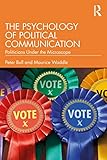The psychology of political communication : politicians under the microscope / Peter Bull.
Publisher: London : Routledge, 2023Description: xi, 182 pagesContent type: text Media type: unmediated Carrier type: volumeISBN: 9781032327990; 978103232799; 9781003326533Subject(s): Communication in politics -- Great Britain| Item type | Current library | Class number | Status | Date due | Barcode | |
|---|---|---|---|---|---|---|
| Book | House of Lords Library - Palace Dewey | 320.014 BUL (Browse shelf(Opens below)) | Available | 021497 |
Microanalysis -- Theoretical approaches -- Techniques of analysis -- Claps and claptraps: how political speakers and audiences interact -- Being slippery? Equivocation in political interviews -- The Westminster Punch and Judy show?: Leaders' exchanges at Prime Minister's Questions -- Political journalism -- Summary and conclusions.
"Contemporary politics is mass-communication politics. Politicians are not only seen and heard, they are seen and heard in close-up through television appearances, speeches, interviews, and on social media. in this book , the authors analyse the ways in which politicians communicate with each other, the media, and the electorate; they also discuss the implications of contemporary political discourse on the democratic process as a whole. Politicians in interviews are typically castigated for their evasiveness. However, microanalytic research shows that there is more to political discourse than this apparent ambiguity. This book reveals how equivocation, interruptions, and personal antagonism can offer valuable insights into a politician's communicative style. The authors review their empirical research not only on political interviews but also on speeches, parliamentary debates, and political journalism. further insights include how political speakers interact with their audiences, how party leaders engage in adversarial discourse and PMQs, and how the spoken messages of politicians can be affected by modern journalistic editing techniques. thereby, this research generates greater awareness of communicative practices in a diverse range of political contexts. While the interviews and parliamentary debates analysed pertain to UK politics, the speeches also draw on the USA, and European and Far Eastern nations. This engaging book is a fascinating resource for students and academics in psychology, politics, communication, and other related disciplines such as sociology and linguistics. The research is also extremely relevant to policy makers and practitioners in politics and political journalism." -- Taken from back cover.
